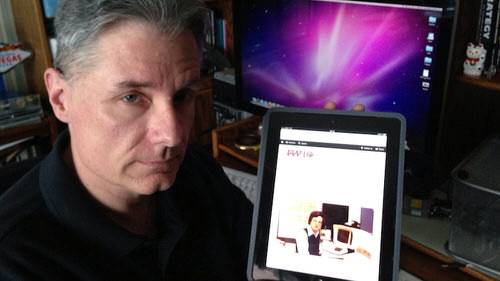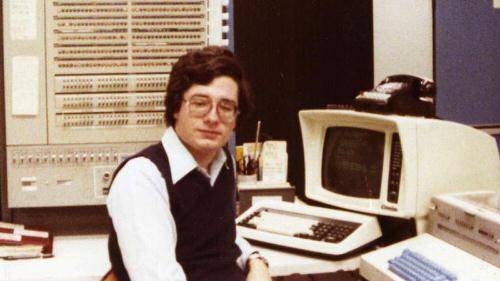
Worried about your longevity as a worker in the fast-moving tech industry? What you need is some inspiration from John Sloan.
Who’s John Sloan? He’s the man pictured in a photo I used in a recent post on 10 Technology Skills That Will No Longer Help You Get A Job. (See that photo below – or on the iPad in the photo above.) While Sloan may look like a symbol of outdated technology in the older photo, he’s actually the polar opposite. As, in fact, the newer photo of him above should lead you to believe.
Sloan, aka Chip Overclock, has not only participated in the many amazing, globe-spanning, nano-shrinking changes in computer tech over the past four decades, he has stayed current with the changes – and kept himself gainfully employed – by taking full responsibility for his own career and professional development.
Pictures Tell The Story
The picture below shows Sloan at Wright State University, Ohio, circa 1976. He would soon go on to earn his B.S. in computer science, and later his master’s degree. He’s seated next to an IBM System/360 Model 65.

Sloan, now 56, lives in Denver. Several of his friends saw my story and noticed the photo, and forwarded it to him, which prompted him to contact me. Sloan describes his current career as a “freelance product developer specializing in real-time and highly concurrent systems.” The photo at the top of this post shows Sloan next to his Mac Mini with Cinema Display. That’s a first-generation iPad he’s holding – displaying the original picture, no less.
Why John Sloan’s Story Matters
Talking to John Sloan made it clear that long-term survival in the tech industry was about much more than just mastering a specific set of skills. Instead, it’s all about taking personal responsibility for learning and adapting over the years and decades:
ReadWrite: Getting a computer science degree in 1976 was an awfully forward-thinking move.
John Sloan: It was the closest I could get to living in the kind of science fictional universe that I was reading about and watching on television. I still remember today watching the very first episode of the original Star Trek.
ReadWrite: Are you currently employed?
John Sloan: I’m a self-employed, offering consulting and contracting through my one-man company, Digital Aggregates, and have been since 2006.
ReadWrite: How do you stay connected to all the changes in the computer industry?
John Sloan: I spend almost all my time (when not working with clients) on professional development. I read, I attend conferences, I learn new skills. This is the kind of professional development that companies simply no longer offer anymore to their regular employees. My company exists not just to service my clients, but to keep me current and employable.
Favorite Tech And Tools
ReadWrite: What technologies have you worked on over the years?
John Sloan: I’ve had a lot of career success, almost all in the systems area, much of it working low in the software stack, close to bare metal. I’ve worked on IBM mainframes, PDP-11 minicomputers. Cray supercomputers [all the way] to huge distributed Linux systems. My current gig is developing a tiny PBX with Iridium transceivers that will allow flyers in business jets to make phone calls from anywhere in the world.
ReadWrite: What are your favorite tech tools now?
John Sloan: My iPhone 5. I have no idea how I’d live without it.
ReadWrite: One of the big tech shifts has been the move to open source. How have you tackled this change?
John Sloan: Open source has been very good to me. For several years now a lot of my income has come from hacking open source software ranging from various portions of the Apache software stack written in Java to the Linux kernel and various portions of the GNU software stack in C.
The economics of open source is the most interesting part about it. Back in the mainframe days, you bought the hardware, and got the software and support for free. Now the hardware is almost free, the software is mostly free, and the support is how a lot of companies book revenue.
ReadWrite: What about the shift from desktop to mobile?
John Sloan: Every time I pick up my iPhone 5 or my iPad, I feel like I’m in a science fiction movie. Same goes for the Android mobiles. I also have a Samsung Galaxy tablet. It’s astounding.
Tech Advice For Young And Old
ReadWrite: Do you have any advice for workers who have been in the industry a long time?
John Sloan: Do not trust your career and professional development to your employer. You absolutely must take charge of this yourself.
ReadWrite: What about advice for those just starting out?
John Sloan: No matter what technologies is being taught when a freshman enters university, they will almost certainly not be the ones being taught when that senior graduates. And whatever technologies that student learns will not be what he ends up needing expertise in when he enters the workforce. Continuous, life-long learning isn’t a buzzword, it’s a requirement.
People who grasp specific technologies but can’t quickly learn new ones on their own are the ones who are going to be laid off or whose jobs are going to be outsourced.
ReadWrite: Anything else you want to add?
John Sloan: Hardly a day goes by in which my wife of nearly 30 years and I don’t remark on how lucky we’ve been. Just the other day one of my friends and former Bell Labs colleagues remarked that she was surprised that she still got paid good money to do what she loves to do. I feel the same way.
Lead image courtesy of Flickr.

















